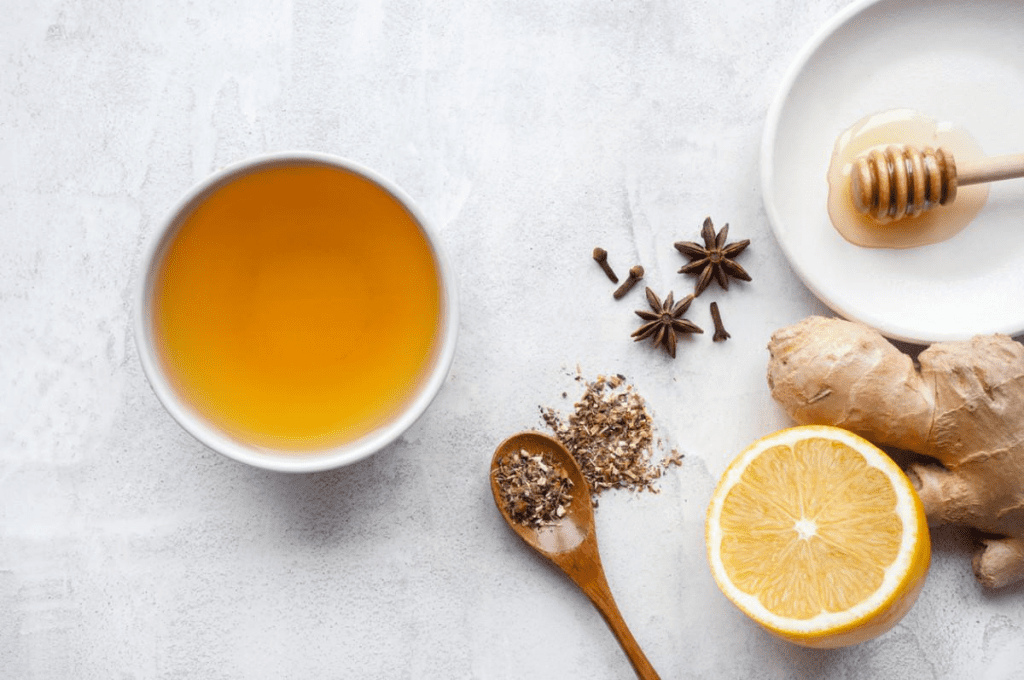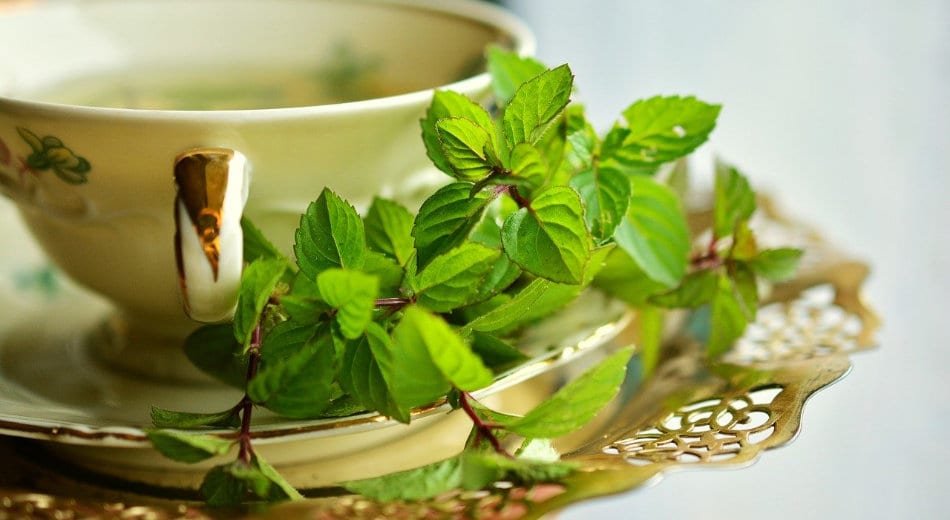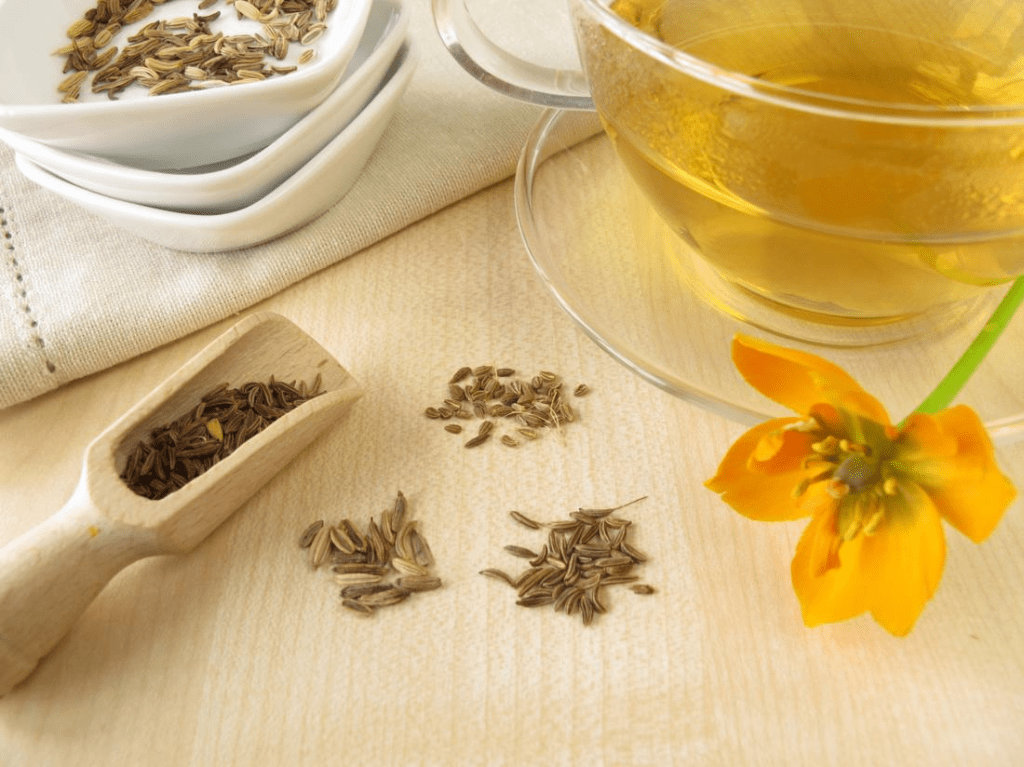Diarrhea is unpleasant and can cause symptoms that include dehydration, fatigue, and nutrient deficiencies. The problem can be caused by a host of actors ranging from bacteria and viruses to intestinal inflammation and irritable bowel syndrome. Whether you ate something bad or simply caught a bug, you can rest easy knowing that there are tasty natural remedies to feel better fast.
Food allergies. Fast food. Digestive tract issues. Sickness. We’ve all been plagued by an upset stomach at one point or another, and fixing the problem can be frustrating. The best solution is often pinpointing the root cause, but if you need a quick fix or something that will alleviate pain in the meantime, a warm cup of tea is here to save the day.

There are several different types of tea that can help settle an upset stomach, and with an array of flavors from sweet and floral to pungent and sharp, it tastes great in the process. To help you feel better, we’ve put together a list of the best teas to calm your stomach and temper painful symptoms. And if you want to get some for yourself, we have a collection of the best teas for your tummy right here.
Tea is a go-to cure when it comes to immune health and battling the common cold or flu. We’ve gathered a list of the best herbal teas and true teas for diarrhea so you can get healthy and back to the important things in your life. Want to get your hands on tea to soothe your upset stomach?
1. Chamomile Tea for Diarrhoea

Our Egyptian Chamomile tea is just what you need to soothe stomach pain and decrease inflammation that causes diarrhea. Chamomile tea is made using the buds of chamomile flowers. It’s known worldwide as a soothing, relaxing brew and one of the best home remedies for abdominal pain. Chamomile tea offers carminative properties, which help to reduce feelings of gas and bloating that can cause upset stomach. Chamomile tea reduces abdominal gas, which alleviates sensations of pain caused by stomach cramps. This tea also contains anti-inflammatory properties that can help soothe stomach conditions including irritable bowel syndrome.
Chamomile tea is a delightful herbal tea made from infusing the chamomile blossoms in hot water. The tea is renowned for its calming and soothing effects, which can help quiet an upset stomach. The tea boasts antibacterial and antiviral properties that may help to eliminate parasites and harmful pathogens that cause diarrhea in the first place.
An animal study conducted in Ireland found that chamomile tea helped to reduce diarrhea symptoms in rats. The study also found that not only did chamomile tea soothe diarrhea symptoms, but it could also prevent them from occurring.
Another study found that a combination of myrrh, coffee charcoal, and chamomile helped to treat acute diarrhea caused by irritable bowel syndrome and inflammation of the gastrointestinal tract. The study was conducted in 1062 patients and showed that the herbal remedy was as effective as conventional treatments.
2. Ginger Tea for Diarrhoea

Ginger tea has been used for thousands of years as a cure for nausea and digestive problems. It offers a variety of health benefits and healing compounds to alleviate upset stomach. Many people reach for the ginger ale when feeling symptoms of stomach pain or nausea, but ginger tea contains higher concentrations of the compounds that alleviate these digestive issues; making it the better choice for feeling better faster.
This tea is made using fresh ginger root and packs a punch when it comes to healing symptoms of upset stomach. Ginger is a natural remedy for nausea and is often used to treat morning sickness in pregnant women and motion sickness caused by planes and boats. Ginger tea is made from the rhizome of the ginger plant and boasts a slightly spicy flavor and tingling scent. The tea can help to soothe symptoms of diarrhea including abdominal pain and nausea. Ginger also offers a range of health benefits including improved digestion, decreased inflammation, and increased blood flow.
An animal study conducted by Chinese researchers found that ginger helps to treat diarrhea caused by bacteria such as E. coli. The researchers attributed the results to a ginger compound known as zingerone, which helps to decrease inflammation and supports the digestive system. Additional research shows that ginger can help treat nausea caused by motion sickness and diarrhea caused by spoiled food.
3. Green Tea

Green tea is one of the most well-researched beverages. Scientists have found evidence that green tea helps boost human health by improving cardiovascular health and preventing serious disease. Most research shows 3 to 5 cups of green tea as the most effective dosage for these benefits. This powerhouse tea may also help soothe digestive problems and treat symptoms including stomach pain and diarrhea.
A study published in BioMed Central examined the effects of green tea on treating digestive problems. Researchers found that green tea is effective in promoting healthy bowel movements and preventing stomach problems caused by bacteria. The study found green tea was particularly effective against Helicobacter pylori infections that cause diarrhea thanks to a high concentration of catechins. Drink green tea to help soothe stomach pain and to treat mild cases of diarrhea.
4. Peppermint Tea for Diarrhoea

Peppermint tea has long been used in traditional medicine to treat digestive issues. The tea is brewed by infusing a handful of peppermint leaves in a cup of hot water. It offers a refreshing flavor and pungent aroma that can help soothe nausea and move food more efficiently through the digestive tract. Peppermint tea has been an integral part of alternative medicine for centuries. The leaves help to alleviate pain associated with menstrual cramps and nausea — it’s one of the best teas to settle your stomach. Peppermint has been shown to inhibit pain receptors originating in the colon that lead to severe pain in the stomach muscles.
The best part about peppermint tea is that you can easily grow these leaves right in your own kitchen to soothe a stomach ache. Peppermint tea is a hardy, fast-growing crop that grows well in most climates. Simply harvest a few leaves, add to a tea ball and combine in a tea mug with hot water. Let steep for 2 to 5 minutes, tasting every 30 seconds for your desired flavor.
Studies show that peppermint tea may help to treat diarrhea caused by irritable bowel syndrome. One study of 74 patients found that those who took peppermint oil three times daily for six weeks showed a significant decrease in cases of stomach ache.
Additional research published at the Milton S. Hershey Medical Center shows that peppermint can help with indigestion, flatulence, and bloating—symptoms that often accompany diarrhea. Research showed that mint compounds including menthol help to soothe mucous membranes and the lining of the stomach to decrease inflammation and irritation. The tea also boasts anti-inflammatory properties that help soothe intestinal inflammation that can cause diarrhea.
5. Black Tea for Diarrhoea

Black tea is made from the leaves of the Camellia sinensis plant and offers a bold flavor with earthy and woody notes. It also offers health benefits that are backed by scientific research when it comes to treating diarrhea.
One study published in the Journal of Evidence-Based Complementary and Alternative Medicine found that black tea helps to treat nonbacterial diarrhea in children. The study consisted of 120 patients between the ages of 2 and 12. The patients were divided into two groups, one which received a black tea tablet and another that received a placebo. The group that consumed black tea had significant improvement of diarrhea symptoms including defecation frequency and a decrease of loose stools.
Black tea contains caffeine that can cause diarrhea to worsen. Keep black tea intake to one or two cups per day if you have a bout of diarrhea to avoid worsening the condition and other negative side effects. Alternate between a cup of black tea and herbal teas like Apple Spice Tea, clear broth, sports drinks, or apple juice to keep your fluid intake up and caffeine intake down.
6. Fennel Tea for Diarrhoea

Fennel tea is made using the fennel seeds of the Foeniculum vulgare plant. The ancient Romans and Greeks believed fennel offered increased strength and health that could provide a longer life. Researchers have found that fennel seeds and fennel tea can help to stimulate the flow of gastric juices and reduce pain thanks to antispasmodic and carminative properties. Chinese medicine has used fennel tea to treat gastroenteritis, indigestion and hernias for centuries. It is frequently used in holistic healthcare to treat digestive issues as it offers anti-inflammatory properties that help to soothe stomach muscles and reduce cramps.
Research published in the European Journal of Pharmaceutical and Medical Research found that drinking fennel tea regularly can help prevent the onset of diarrhea. That’s because fennel tea helps to streamline digestion. Scientists also found that fennel tea boasts anti-ulcer benefits in addition to its anti-diarrheal benefits. Additional research shows fennel tea is effective in treating colic in infants.
7. Lemon Tea for Diarrhoea

Treat diarrhea at the source with a piping hot cup of lemon tea. Simply infuse the lemon in warm water and add a dash of honey if desired. The tea offers a citrus flavor with a touch of sweetness.
Research shows that lemons contain antioxidants and other chemical compounds that can fight off bacterial and viral infections. One study showed that among citrus fruits, lemon juice and lime juice had the highest concentration of bacteria-fighting compounds.
Scientists in Heidelberg also found that lemons can help fight off norovirus infections that can cause diarrhea. The lemon juice can also be used as a disinfectant to clean your home to prevent other family members contracting the disease.
8. Licorice Tea for Diarrhoea

Licorice tea has a potent flavor that is often an acquired taste. It’s made from licorice root, which is native to Europe and Asia and derived from the plant scientifically known as Glycyrrihiza glabra. Used extensively by the Egyptians and in China as part of traditional medicine, licorice root tea not only soothes your stomach, but can also help to repair and restore the stomach lining.
In a study published in Phytotherapy Research, researchers found that licorice root can inhibit the growth of the bacteria H. pylori, which is known to cause peptic ulcers. The anti-inflammatory properties of licorice tea help to soothe and alleviate pain in the gut, while chemical compounds help to rebuild the stomach lining, furthering gut health.
This tea is a good choice if you suffer from stomach ulcers or other conditions that deteriorate the lining of your stomach. To consume, simply add 1 to 5 grams of the licorice root to boiling water. Drink three times per day, preferable before each meal for the best results. Licorice tea can be consumed daily for up to one week. After that, you should take a break from licorice root for two to three weeks before consuming again to avoid side effects including headaches and heart problems.
9. Basil Tea for Diarrhoea

Holy Basil tea is not made with the same type of basil that you put on top of your pizza. Instead, holy basil tea is made from the Ocimum tenuflorum plant and known commonly as tulsi tea. This tea is native to Southeast Asia and is used widely in Indian medicine and Ayurveda. Studies have shown holy basil tea offers the ability to decrease stomach acid, and increase and extend the life of mucus cells — surface cells that line the digestive tract and protect it from disease. These studies also showed that holy basil leaves can reduce the presence of stomach ulcers, which can cause severe discomfort and disruption in the digestive system.
To use tulsi tea to eliminate ulcers and decrease pain, brew tea using 2 to 3 teaspoons of holy basil leaves per 8-ounce cup. Allow the leaves to steep for 5 to 6 minutes before straining and consuming. Avoid adding sugar or other flavorings to tulsi tea, which can aggravate stomach pain and ulcers.
Rounding Off: The Best Tea for Diarrhoea?
If you’re suffering from diarrhea, drinking tea can help you feel better faster. Herbal teas have long been a staple of home remedies for treating the common cold and flu. These teas contain compounds that help boost digestive health and can ease the symptoms of diarrhea.
Pair your cup of tea with a healthy diet to help your digestive system recover. Experts recommend sticking the to BRAT diet—bananas, rice, applesauce, and toast. These foods help the gut reset while also reducing the amount of stool the body produces.
Armed with this handy list of teas that are backed by scientific research, you’ll know where to turn the next time you have diarrhea. Use these teas to treat an upset stomach and soothe symptoms such as pain and bloating. Sit back, get some rest, and sip to your health with these tasty teas.



